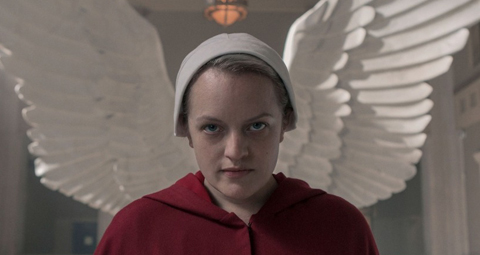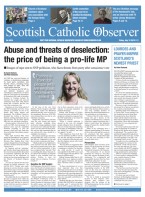July 19 | ![]() 0 COMMENTS
0 COMMENTS ![]() print
print

The pro-life, pro-Christian message of The Handmaid’s Tale
Despite becoming a favourite of pro-abortion advocates, the American TV show illustrates a positive religious message, writes Emily Black.
In the television show The Handmaid’s Tale—based on the best-selling novel of the same title by Margaret Atwood—a dystopic America is envisioned in which a theocratic society called Gilead has taken over. Set during a fertility crisis, fertile women are forced to bear children for the totalitarian society governed by elite men.
The show, the third season of which is currently airing, has been misread as an endorsement of pro-abortion, anti-Christian views. In fact, it illustrates the value and truth of a pro-life, Christian perspective.
In The Handmaid’s Tale, powerful men have turned Christianity into a weapon to render women subservient and to reduce them to their childbearing function.
Enslavement of women
In Gilead, this attitude has been perverted to the extreme and society has turned the sexual enslavement of women into a moral good. The male leaders demean women, while almost deifying new life.
Science fiction and dystopia are genres where imagination and experiment can be used to identify and explore issues present in the real world. Most viewers have understood ‘the issue’ that The Handmaid’s Tale critiques to be the pro-life movement.
However, Gilead’s attitude is anything but pro-life.
Enslavement
The show does not back the pro-choice agenda. It is a thought experiment that delves into the dangers of rendering one group of humanity as inferior.
Interpreting the show as being pro-abortion misses a key component of the story: the enslaved women love their unborn children, babies that they conceived through rape. The main character, June, directs her righteous anger towards the culprits: the men and women who enable these atrocities to occur, and directs only love towards her unborn child.
She whispers tenderly to the baby in her womb, while plotting to undermine the family who want to steal it from her once it is born.
Risking lives
June, and many mothers throughout the story, risk their lives to save their children. They are fiercely protective, fiercely loving mothers.
The show is, at its core, a celebration of motherhood, of children, and of the gift of life.
It is also a celebration of Christianity. Gilead is a Christian theocracy where only men are allowed to read the Bible, meaningless sayings such as ‘praise be’ are parroted back and forth, and Christian teaching is twisted to suit the needs of those in control.
False Christianity
Again, this might seem like a critique of Christian religion in our society.
However, Gilead’s false Christianity is contrasted against June’s growing Christian identity. We witness her emotional pleas to God for help, her quiet moments of prayerful thankfulness, and her deepening belief that He is watching over her.
These subtle moments build throughout the show and culminate more concretely in episode four of season three, ‘God Bless the Child.’
Before Gilead
In Gilead, a mock-Christian, empty ceremony takes place, and everyone gathers together to celebrate the children who have been born. As she watches, June remembers the life she had before Gilead. In a flashback we watch as she and her husband bring their new daughter, Hannah, to a church to be baptised. June’s mother voices her disapproval, cautioning them not to let religion rule their life.
June is steadfast and they go forward with the baptism. Afterwards, the couple have a moment together where they reflect on how important it was, that it was their way of thanking God for the gift of their child.
Separation
June’s husband escaped to Canada when Gilead took over, but June and her child were captured and separated. Later, June, now living captive in Gilead, gives birth to a new child, Nicole, and risks her life to get the baby to her husband. She could have escaped the horrors of Gilead too, but she cannot abandon her first child, Hannah, so stays behind.
The episode ends with Nicole being baptised in Canada, with her mother’s loved ones giving thanks to God for her life and ‘absolving’ her of Gilead’s sins.
While The Handmaid’s Tale deals with contentious issues such as consent, feminism and bodily autonomy, viewers do not have to look far to find a hopeful message that celebrates the gift of life, the tenacity of the human spirit and the beauty of Christian Faith.










